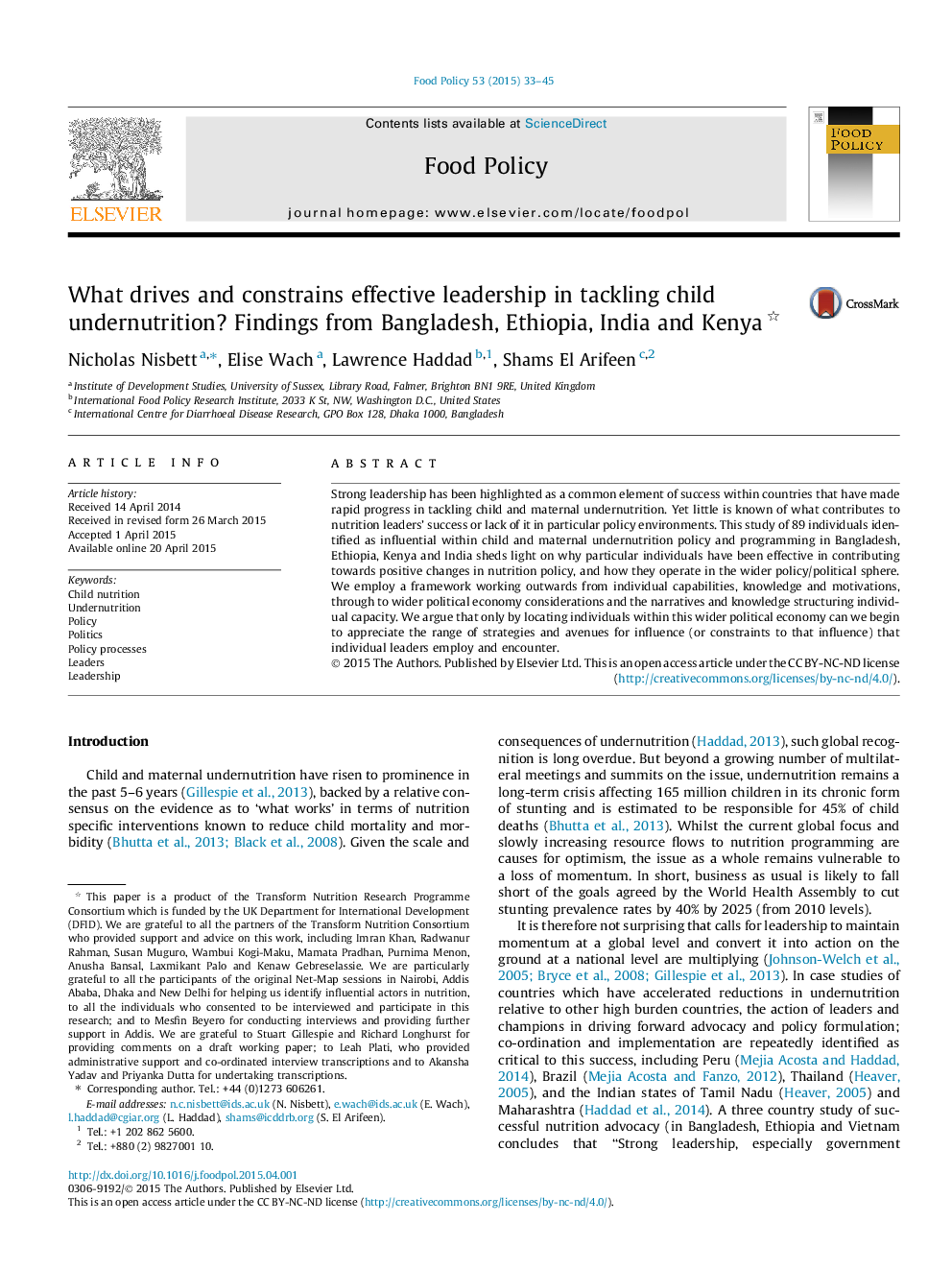| کد مقاله | کد نشریه | سال انتشار | مقاله انگلیسی | نسخه تمام متن |
|---|---|---|---|---|
| 5070362 | 1477023 | 2015 | 13 صفحه PDF | دانلود رایگان |
عنوان انگلیسی مقاله ISI
What drives and constrains effective leadership in tackling child undernutrition? Findings from Bangladesh, Ethiopia, India and Kenya
ترجمه فارسی عنوان
چه چیزی باعث رهبری موثر در مقابله با سوء تغذیه کودک می شود؟ یافته های بنگلادش، اتیوپی، هند و کنیا
دانلود مقاله + سفارش ترجمه
دانلود مقاله ISI انگلیسی
رایگان برای ایرانیان
کلمات کلیدی
تغذیه کودک، ضد التهاب، سیاست، سیاست، فرآیندهای سیاست، رهبران، رهبری،
ترجمه چکیده
رهبری قوی به عنوان یک عنصر مشترک از موفقیت در کشورهای پیشرفت کرده است که در مقابله با سوء تغذیه کودکان و مادران پیشرفت کرده اند. با این حال کمی از آنچه که در موفقیت های رهبران تغذیه یا عدم وجود آن در محیط سیاست های خاص کمک می کند شناخته شده است. این مطالعه از 89 نفر که به عنوان سیاستگذاری و برنامه ریزی نامطلوب در کودکان و سیاست های کمبود تغذیه مادران در بنگلادش، اتیوپی، کنیا و هند شناخته شده است، روشن می کند که چرا افراد خاص در ایجاد تغییرات مثبت در سیاست تغذیه موثر بوده اند و چگونه در سیاست های گسترده تر کار می کنند / حوزه سیاسی ما چارچوبی را به کار می گیریم که از توانایی ها، دانش و انگیزه های فردی، به وسیله ملاحظات اقتصادی گسترده تر و روایت ها و ظرفیت های فردی دانش سازمانی، کار می کنند. ما استدلال می کنیم که تنها با قرار دادن افراد در این اقتصاد سیاسی وسیع تر می توانیم درک طیف وسیعی از استراتژی ها و راه هایی برای نفوذ (یا محدودیت هایی که بر نفوذ آن) وجود دارد که رهبران فردی آنها را درگیر و مواجه می کنند.
موضوعات مرتبط
علوم زیستی و بیوفناوری
علوم کشاورزی و بیولوژیک
دانش تغذیه
چکیده انگلیسی
Strong leadership has been highlighted as a common element of success within countries that have made rapid progress in tackling child and maternal undernutrition. Yet little is known of what contributes to nutrition leaders' success or lack of it in particular policy environments. This study of 89 individuals identified as influential within child and maternal undernutrition policy and programming in Bangladesh, Ethiopia, Kenya and India sheds light on why particular individuals have been effective in contributing towards positive changes in nutrition policy, and how they operate in the wider policy/political sphere. We employ a framework working outwards from individual capabilities, knowledge and motivations, through to wider political economy considerations and the narratives and knowledge structuring individual capacity. We argue that only by locating individuals within this wider political economy can we begin to appreciate the range of strategies and avenues for influence (or constraints to that influence) that individual leaders employ and encounter.
ناشر
Database: Elsevier - ScienceDirect (ساینس دایرکت)
Journal: Food Policy - Volume 53, May 2015, Pages 33-45
Journal: Food Policy - Volume 53, May 2015, Pages 33-45
نویسندگان
Nicholas Nisbett, Elise Wach, Lawrence Haddad, Shams El Arifeen,
